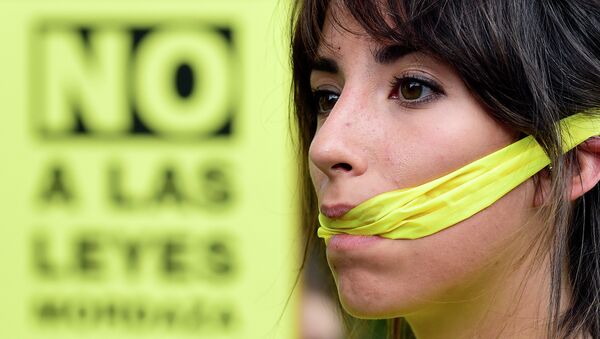An unnamed woman, from Petrer in Alicante, south-east Spain, uploaded a photo of a police car parked in a disabled parking bay to Facebook accompanied by the comment:
"Park wherever the hell you like and they won't even fine you."
She deleted the photograph the day after it was published but that was enough time for local police to trace her and slap an €800 fine under Spain's controversial new citizen security law.
Woman fined for Facebook pic of police car in disabled spot, Spain. Crack down on social media http://t.co/q5XN1PvFDJ pic.twitter.com/A2aqisV0Le
— Caroline Shield (@simonshieldcars) August 17, 2015
The Citizens Security Law, introduced on 1 July forbids "the unauthorized use of images of police officers that might jeopardize their or their family's safety or that of protected facilities or police operations".
Opponents of the law have argued that the woman took a photograph of a police vehicle and not police officers, so could not have put them in danger.
However, a spokesman for the local police, explained that the woman was fined because officers felt that their "honour had been attacked".
They had parked in the disabled bay because they were responding to a report of vandalism in a nearby park, something which needed an "urgent response", and in emergency they were allowed to park wherever they could, the spokesman said.
Man calls police 'slackers' on Facebook, falls foul of Spain's new 'gag… https://t.co/8YbInOmYoM #Security #Hacking pic.twitter.com/sUzCxe9Iev
— OXITS (@OXITS) August 13, 2015
This brings little consolation to the critics of the law, with Amnesty International passing this judgement in its report on the law. Virginia Alvarez, the report's author said:
"With threats of fines or threats of being beaten, the government is trying to stigmatize and criminalize people who are just practicing their rights […] instead of listening to their demands, instead of starting a dialogue, authorities are doing everything they can to impede people from protesting."
A widely shared view on social media is that the new "gag law" as it has been immediately dubbed harks back to the repressive days of the Franco regime.
Perhaps someone should create a revolving crowdfunding site to finance the fees assessed by unfair gag law in Spain? https://t.co/uP0DpnGFU2
— boyd cohen (@boydcohen) August 17, 2015
But with a difference, wrote one contributor — with Franco at least you had a job guaranteed unless you were Communist and crime was at a lowest. It's like the same repression we had with Franco but with the bad shit we had during the last years of democracy. Plus corruption and externam debt.
@olivepress obviously Franco is still a law maker in Spain.
— Mike dc-m (@mike_dc_m) August 16, 2015
Spain brought in its new public security law on 1 July, introducing fines between €100 and €600,000 for a host of "offences".
Here's a list of actions and penalties that are allowed by Spain's law and it's complete and utter BS pic.twitter.com/lPYkExmBE0
— AnjunaDhop (@Dhop_87) December 28, 2014
This is not the first case of an individual facing fines in Spain over content they have published on Facebook.
A resident of Tenerife was fined after he called his local police force a "class of slackers" and criticized the amount of money spent on police facilities in a series of Facebook posts.
Glowing Toilets in Spain Protest Gag Law That Dumps O… http://t.co/kFAyLXpNTj #trends | https://t.co/uPZMU2hMCz pic.twitter.com/MHy1CPJMcf
— Felipe Delphorno (@whatinspires_us) July 14, 2015
The law has prompted protests in over 30 Spanish cities since it was passed. They included the world's first virtual demonstration in which thousands of human holograms marched outside the Spanish parliament in Madrid arguing that holographic people are given greater freedoms that those in real life.
World's first hologram protest in Madrid. 1000s join virtual march against law banning demos http://t.co/TIlbFixCy1 pic.twitter.com/eEi3aAKBBW
— Jane Garcia (@janegarcia) April 16, 2015
Judge Joaquim Bosch, who is the spokesperson for Judges for Democracy said:
"It is not a law for citizens' security, but a law for the government to avoid citizens' protests. All opinion polls indicate that the Spanish society is not at all preoccupied by security but by the economic situation and political corruption."
The popular view on the Spanish authorities attitude to public safety is summed up by another social media contributor: "yet they have done nothing to stop the 100's of pick pockets working the cities of Barcelona or Madrid. The link of the present ruling party back to a dictator certainly shows it's head again."



